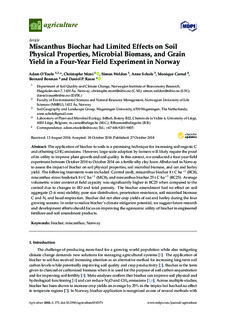Miscanthus Biochar had Limited Effects on Soil Physical Properties, Microbial Biomass, and Grain Yield in a Four-Year Field Experiment in Norway
O'toole, Adam Thomas; Moni, Christophe; Weldon, Simon Mark; Schols, Anne; Carnol, Monique; Bosman, Bernard; Rasse, Daniel
Journal article, Peer reviewed
Published version
Permanent lenke
http://hdl.handle.net/11250/2571409Utgivelsesdato
2018-10-27Metadata
Vis full innførselSamlinger
Sammendrag
The application of biochar to soils is a promising technique for increasing soil organic C and offsetting GHG emissions. However, large-scale adoption by farmers will likely require the proof of its utility to improve plant growth and soil quality. In this context, we conducted a four-year field experiment between October 2010 to October 2014 on a fertile silty clay loam Albeluvisol in Norway to assess the impact of biochar on soil physical properties, soil microbial biomass, and oat and barley yield. The following treatments were included: Control (soil), miscanthus biochar 8 t C ha1 (BC8), miscanthus straw feedstock 8 t C ha1 (MC8), and miscanthus biochar 25 t C ha1 (BC25). Average volumetric water content at field capacity was significantly higher in BC25 when compared to the control due to changes in BD and total porosity. The biochar amendment had no effect on soil aggregate (2–6 mm) stability, pore size distribution, penetration resistance, soil microbial biomass C and N, and basal respiration. Biochar did not alter crop yields of oat and barley during the four growing seasons. In order to realize biochar’s climate mitigation potential, we suggest future research and development efforts should focus on improving the agronomic utility of biochar in engineered fertilizer and soil amendment products.

